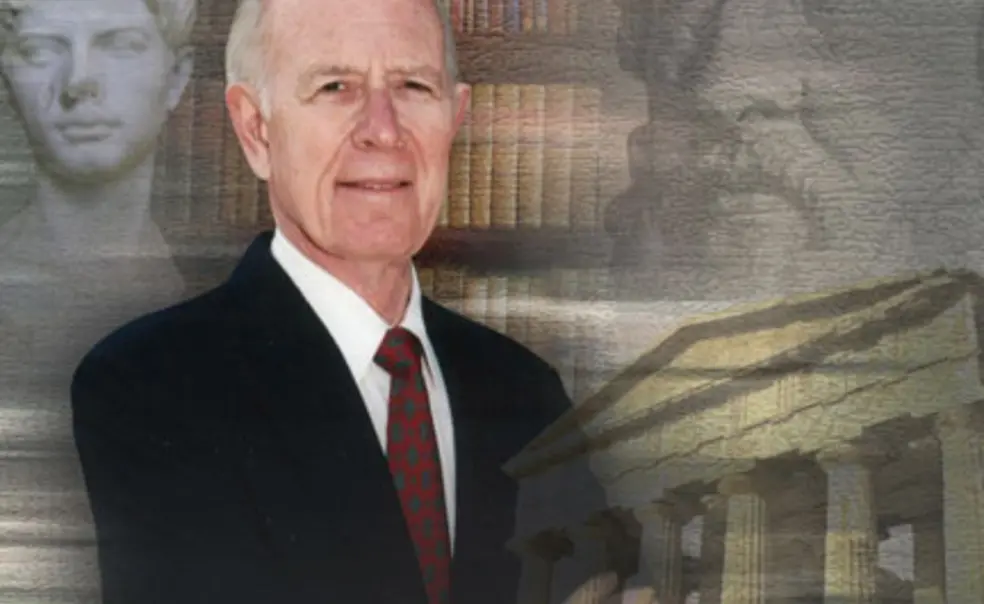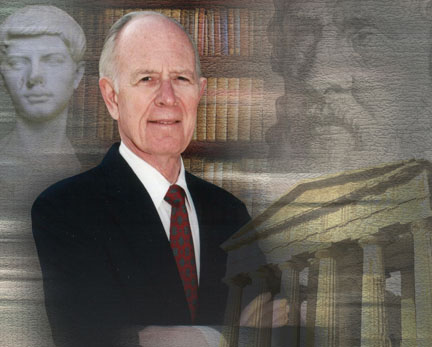James H.S. McGregor ’68 *75 is a professor of comparative literature at the University of Georgia.
Professor Robert Fagles was known to multitudes throughout the English-speaking world as a translator of Aeschylus, Sophocles, Homer, and Virgil. A much smaller number knew him as a teacher. That was a privilege reserved for the men and women of Princeton. In my time on campus I took every course that he offered, and we remained friends throughout his life.
Fagles taught by example, and learning from him was like an apprenticeship. What you were being encouraged to learn was communicated on multiple fronts simultaneously. First, language. When you read an interview with Fagles — and many have been published — you immediately will be impressed by the careful turn of phrase, the slightly unusual choice of words, the dramatic emphasis and secure movement of thought. You will assume that an editor has removed all the “ums” and “ahs,” the sentence fragments and self-corrected thoughts. You will be wrong. What you are reading is exactly what Professor Fagles said in exactly the way he said it.
He never talked about that discipline of language; he just demonstrated it. He was fond of apt quotations. To his mind each word needed to be clear, concise, well chosen, and up to its particular job. Fagles was no crafter of elegant phrases without substance. The discipline of language was a way of getting at something more substantial.
That something was the tradition of great literature, which was also the focus of his ambitious translations. He seldom taught a poet or a book in which he did not believe profoundly. He was acutely aware that the long history of literature offers as many examples of forgetting as it does of remembrance. Gilgamesh, a poem that inspired Homer, was lost for more than two millennia, only to be rediscovered on the cusp of the 20th century. Homer in his turn influenced Virgil, but Dante, who brought the ancient epic back to life in the 13th century, had no access to the Greek language and its poetry. History teaches that even the greatest works can disappear into oblivion. For these poems to remain vital, they need to be discussed intelligibly and translated into language that speaks intimately and persuasively to each new generation of readers.
The Russian literary critic Mikhail Bakhtin pointed to a sharp divide between the ancient epic poem and the novel. He believed that the novel is always about people like us living in a world that we share. The epic or Greek tragedy, on the other hand, is about people who lived in a time and an imaginative space that is cut off from our world. Fagles took a different view. He recognized the gap between our experience and Homer’s, and he was fond of quoting a line from W.H. Auden that characterized it: “The eye of the crow and the eye of the camera look out on Homer’s world, not ours.” At the same time, Fagles understood that the ancient heroes whose experiences exceed ours are working with the same intellect and emotions that we have, and that the relationships that matter to them are ones we also cherish. Fagles knew that modern readers can understand Achilles’ rage, his wounded pride, and the terrible cost it exacts. He was confident that at the end of The Iliad we would come to empathize with its hero’s overpowering grief at the loss of his companion. The gap that separates us from the epic hero is not unbridgeable. Professor Fagles narrowed it still more, never by bringing the heroes of the Greeks down to our level, always by arming his readers to ascend to theirs.
What, in his view, does great literature offer? Not facts or bits of evidence to support theories or assumptions, and certainly not simple moral instruction or the opportunity to assign blame. Literature is about the trajectories of significant characters: what drives them, what they love or hate, how their choices rebound on them and on those they care about, and what they conclude if they have leisure for reflection. But unlike Aristotle, who focused on the individual at the expense of everything else, Fagles was acutely aware of the power of relationships. His favorite characters all were men and women with family ties, and many of the stories that intrigued him involved homecoming.
Some of his favorites, like the family of Agamemnon, were enmeshed in relationships that we would label dysfunctional. Others, like Odysseus, had the ability to love judiciously. Most of these characters got caught up in violence, infrequently as victims, more commonly as perpetrators. What interested Fagles was not the violent personality so much as the fate of violence itself. He was very fond of quoting a line from William Blake’s “Marriage of Heaven and Hell”: “The tigers of wrath are wiser than the horses of instruction.” Portraying the course of violence, what it uncovers in perpetrator and victim, and what it leads to as it works itself out, is the theme of a great deal of classical literature.
Agamemnon comes home from the Trojan War steeped in blood and glorying in his own aggression. This mind-set blinds him to his wife’s equally powerful rage and her lust for his death. She kills her husband, who is avenged by her son, Orestes. Orestes is then pursued by Furies born of the blood he has shed. At the conclusion of the trilogy, a human law court settles an issue that threatened to overwhelm the gods themselves. This is the full trajectory of violence that spends itself in creation.
Like Agamemnon, Odysseus is transformed into a man of violence during the 10-year siege of Troy. He wanders the Mediterranean for another 10 years after the end of the war, and in his long and often fantastic voyaging learns the value of home and reacquires the skills it takes to succeed there. Violence foreign and domestic, war and its aftermath, the work of rediscovering and reinhabiting a home and homeland: Along with the heroes of ancient tragedy and epic, America struggled with these issues during the second half of the 20th century. Professor Fagles always was aware of these deep connections between the classical world and our own. His teaching of language and literature was in the end a training in history, philosophy, and the traits of mind and spirit that enable a fully conscious social and private life.
Professor Robert Fagles died March 26, at 74.













No responses yet